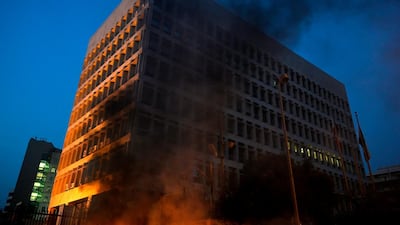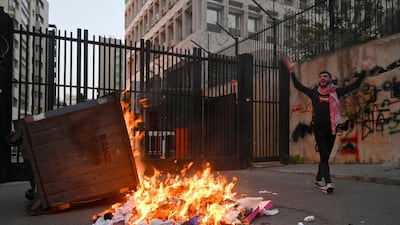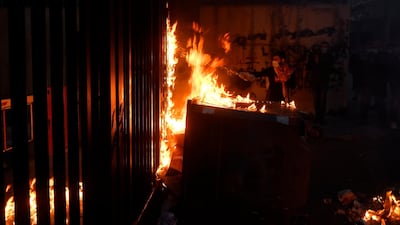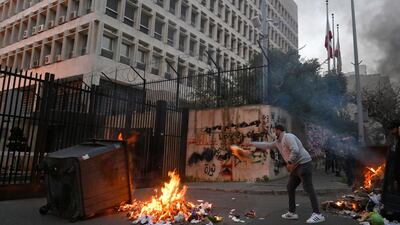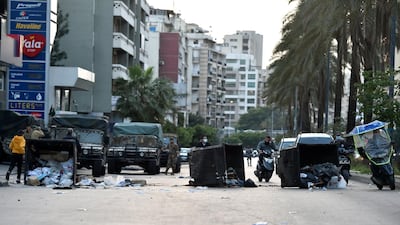Lebanon’s politicians must quickly form a government to help the country weather the economic crisis and access international support, Egyptian Foreign Minister Sameh Shoukry said on a visit to Beirut on Wednesday.
Mr Shoukry's visit comes as France renews efforts to break the eight-month deadlock to form a new government there, amid a deepening crisis and rising tension between Lebanese political groups.
He met the country’s top officials and leaders of major political parties, with the exception of the Free Patriotic Movement and its ally, the Iran-backed Hezbollah.
The FPM was founded by the President, Michel Aoun, and is led by his son-in-law, Gebran Bassil.
Mr Aoun has been trading accusations with prime minister-designate Saad Hariri over who is responsible for the delay in forming a new cabinet.
The recent collapse of talks between them pair came days after Hezbollah, a staunch ally of the president, called on Mr Hariri to form a cabinet of experts and politicians backed by the country’s major parties.
But Mr Hariri insists on a government of non-partisan experts.
Mr Shoukry threw Egypt’s weight behind Mr Hariri’s attempt to end the political vacuum almost eight months after a huge explosion killed more than 200 people in Beirut last August.
The explosion led to the resignation of Mr Hariri's predecessor, Hassan Diab, and his government.
“Egypt is keen on [preserving] Lebanon's security and stability, which requires ending the current stalemate and forming a new government,” Mr Shoukry said after talks with the prime minister-designate.
Their meeting followed talks with Mr Aoun and Parliamentary Speaker Nabih Berri, before he went to Bkirki, the seat of Lebanon’s influential Maronite church, to meet its leader, Patriarch Bechara Rai.
Cardinal Rai recently led a campaign calling for Lebanon to adopt neutrality to protect the country against the spill-over of regional conflicts, which drew criticism from Hezbollah.
Earlier in the day, Mr Shoukry voiced concerns over the worsening crisis and said Egypt was engaging with all parties to overcome the problems.
"The necessary decisions to overcome the crisis must be taken urgently," he said.
"Egypt’s interest stems from its close relationship with Lebanon, whose stability is vital to the stability of the region."
His concerns were echoed by French Foreign Minister Jean-Yves Le Drian, who blamed the country’s ruling class for the second time in a few weeks for the worsening crisis.
“If some Lebanese officials do not take their responsibilities, we will not hesitate to assume ours in this respect,” Mr Le Drian said.
He hinted at the possibility of sanctions against a number of Lebanese politicians.
“The decisions they make or refuse to make over the next few days will be decisive," Mr Le Drian said.
"This is the message that the president and I passed on to the main Lebanese political leaders yesterday."
French President Emmanuel Macron visited Beirut twice after last August's fatal explosion that destroyed large parts of the capital, to try to bridge the gap between rival officials over forming a cabinet of experts.
But Mr Macron's efforts have so far failed to yield results, despite the economic urgency.
More than half of Lebanon’s population lives in poverty, while the national currency has lost more than 85 per cent of its market value against the dollar, amid shortages in foreign currencies.
Dwindling dollar reserves resulted in disruptions to vital supplies of fuel, medicine and food in recent weeks, leading to increased power rationing and fuel shortages.
Kataeb party leader Sami Gemayel, who met with Mr Shoukry in Beirut, called for an independent cabinet that engages with the International Monetary Fund in negotiations to bring in reforms and prepares for parliamentary elections.





